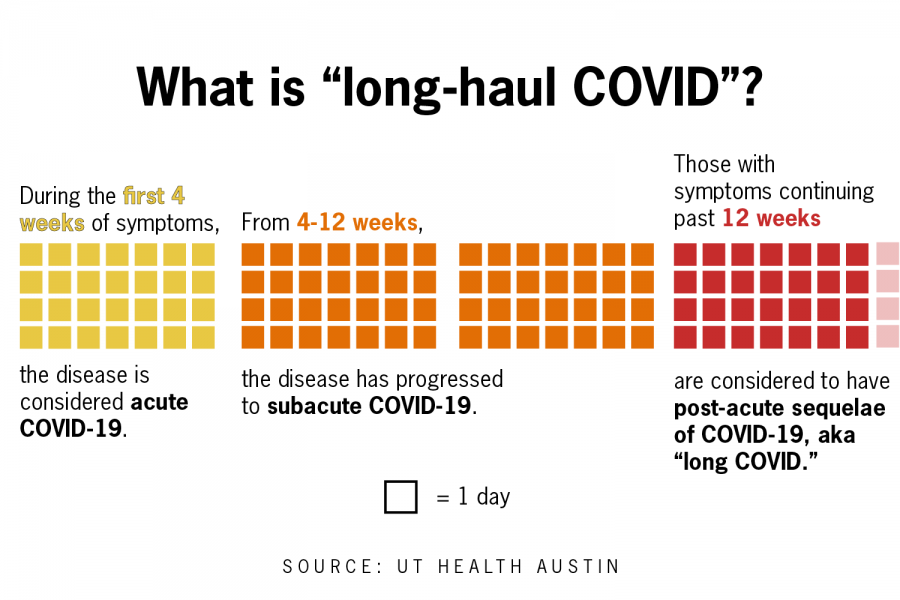‘People don’t know I’m struggling’: UT Health Austin helps those still afflicted by COVID symptoms
October 10, 2021
When Bailey Guinessey contracted COVID-19 in December, she did not anticipate still dealing with symptoms 10 months later.
International business sophomore Guinessey suffers from post-acute sequelae of COVID-19, also known as “long COVID.”The syndrome leaves patients with symptoms from COVID-19 long after their initial illness.
Guinessey said she had no sense of smell until early May, but when it came back, food smelled disgusting to her and she couldn’t eat. She said still dealing with symptoms now affects her mental health.
“If you have a broken arm or leg, people know you’re going through something,” Guinessey said. “They know it sucks, but the thing is that this isn’t a visible or tangible thing that’s happening to me, so people don’t know I’m struggling.”
UT Health Austin has been operating the Post-COVID-19 Clinic, a program that assists patients suffering from PASC, since July.
Michael Brode, medical director for the program, said the clinic aims to be an educational resource for patients and health care providers, a research hub for the long-term effects of COVID-19, and a provider of clinical and mental health care for patients as they recover.
The cause of PASC is currently unknown and there is no approved treatment or medication available to the 10%-30% of COVID-19 patients that experience long-term symptoms, according to Brode and Yale Medicine.
“In the absence of a cure (or) treatment, a lot of it’s talking closely with the patient, seeing what their values are, and making sure we can treat their symptoms appropriately in a way that meets their values,” Brode said.
Brode said the clinic is in the preliminary stages of organizing with other researchers, including the National Institutes of Health, to understand the disease. He said the clinic will see patients for a long period of time, but most will slowly get better.
“As we know, there’s a group of people who have almost a chronic inflammation or new autoimmunity from the disease that will suffer these effects for years,” Brode said.
Brode said some doctors do not believe the patients’ issues are serious since there is little research on PASC. Brode said the doctors at the clinic try to validate and understand what the patient is going through.
Esther Melamed, research director for the program, said it is rewarding to help those suffering from PASC when much is unknown.
“I’ve tremendously enjoyed working with this patient population and hope that we continue to learn so that we can continue to offer better and much more patient-centered, precise care for these patients,” Melamed said.
Brode said most of their patients are under 40 years old and recommended that students get vaccinated against COVID-19.
Guinnesey said long COVID has affected her ability to eat normally and her day-to-day social life, so she urges students to take COVID-19 seriously with the appropriate precautions.
“Be aware of the risks that can happen if you get COVID, and don’t deny the fact that this could happen to you,” Guinessey said.











